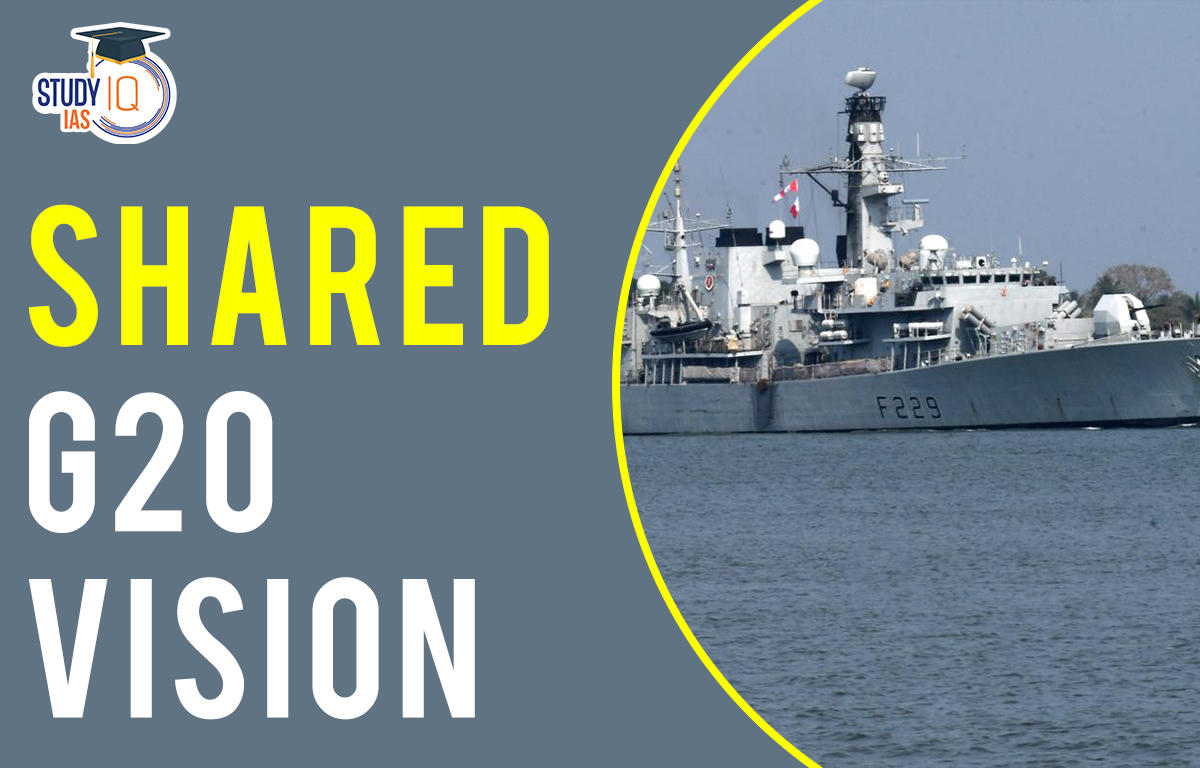Table of Contents
Context: India’s G20 presidency can play an important role in promoting a sustainable blue economy.
What is Blue Economy?
- Definition: The World Bank defines “blue economy” as “sustainable use of ocean resources for economic growth, improved livelihoods and jobs, while preserving the health of the ocean ecosystem”.
- 14th SDG Goal: Developing a blue economy is also linked to the 14th Sustainable Development Goal.
- Activities: Seafood harvesting (fishing and aquaculture), extraction and use of marine non-living resources (such as minerals and oil and gas), generation of renewable energy (such as offshore wind), and commerce and trade are examples of activities that could count towards a blue economy.

India’s Initiatives for Blue Economy
- Draft Blue Economy Policy: It envisages optimal utilization of all sectors of the maritime domain, from living and non-living resources to tourism and ocean energy for sustainable development of coastal areas. The 7 key areas are: (refer to the image)
- Sagarmala Initiative: A Union Government’s initiative that aims to promote port-led direct and indirect development and provide infrastructure to transport goods to and from ports quickly, efficiently and cost-effectively.

- Shipbuilding Financial Assistance Policy: A Union Government’s policy under which financial assistance equal to 20% of the lower of “Contract Price” or the “Fair Price” will be extended to Indian Shipyards for each vessel built by them.

- Pradhan Mantri Matsya Sampada Yojana: A Union Government scheme under which the government is actively facilitating a ‘blue revolution’ through sustainable and responsible development of the fisheries sector.
- Sagar Manthan Dashboard: It is the Real-time Performance Monitoring Dashboard of Ministry of Ports, Shipping and Waterways (MoPSW) that will monitor and track the progress of their projects.
- Deep Ocean Mission: This Mission of the Union Government emphasizes on development of deep-sea technology for deep sea mining, exploration of deep-sea minerals resources and marine biodiversity.
- Coastal Regulation Zone Notification: India adopted the Coastal Regulation Zone notification to classify and better manage coastal regions and conserve ecologically sensitive coastal and marine ecosystems.
- Plastic Waste Management Rules, 2022: These rules have banned select single-use plastic items and introduced policies to combat plastic pollution, including in the marine environment.
India’s G20 Presidency and Blue Economy
- The G20: It is a premier intergovernmental forum for international economic cooperation.
- The forum plays an important role in shaping and strengthening global architecture and governance on all major international economic issues.
- The Group does not have a permanent secretariat.
- India holds the Presidency of the G20 from 1 December 2022 to 30 November 2023.
- India’s Role: The theme of India’s G20 Presidency is – “Vasudhaiva Kutumbakam” or “One Earth. One Family. One Future”.
- Blue Economy: The First G20 Environment and Climate Sustainability Working Group has identified the blue economy is a key priority.
- The aim is to promote adoption of high-level principles that guide sustainable and equitable economic development through the ocean and its resources, while simultaneously addressing climate change and other environmental challenges.
- Blue Finance: G20 presents an opportunity to foster collaborations for advancements in science and technology, promote public-private partnerships, and create novel blue finance mechanisms.
- India’s Active Participation: India’s has active involvement in international and regional dialogues on the Blue Economy, maritime and marine cooperation.
- India’s G20 presidency would play an important role in promoting individual and collective actions to facilitate the transition towards a sustainable blue economy.
- Blue Economy: The First G20 Environment and Climate Sustainability Working Group has identified the blue economy is a key priority.

G20 Initiatives for Blue Economy
- G20 Action Plan on Marine Litter: It promotes the socio-economic benefits of establishing policies to prevent marine litter.
- Osaka Blue Ocean Vision: It aims to reduce additional pollution by marine plastic litter to zero by 2050.
- Coral Research and Development Accelerator Platform: It advances research, innovation and capacity building in all facets of coral reef conservation, restoration and adaptation.
Challenges in Blue Economy
- Extreme Weather: Blue economies are being threatened by intensifying extreme weather events, ocean acidification, and sea level rise.
- Unplanned Urbanisation: Growing marine pollution, over-extraction of resources and unplanned urbanisation also pose significant threats to the ocean, coastal and marine ecosystems, and biodiversity.
- Lack of Capacity: Many developing nations have high levels of external debt. Lack of capacity and technology for transition between the Agri economy and marine economy is also a critical hindrance.
- Lack of Guiding Principle: There is concern that without the elaboration of specific principles or guidance, national blue economies, or sustainable ocean economies, economic growth will be pursued with little attention paid to environmental sustainability and social equity.
- Lack of Collaboration: Achieving this goal of blue economy would need tremendous human effort, and would call for global cooperation through various legal and institutional frameworks.
- Less Funding: The 14th SDG has also got the least amount of long-term funding to the World Economic Forum.
Way Forward
- India’s position as G20 president is also an opportunity to advocate for the global south, where many ocean-dependent communities are vulnerable.
- It is an opportunity for India to ensure environmental sustainability, while providing for social equity and green economy.





















 WhatsApp
WhatsApp